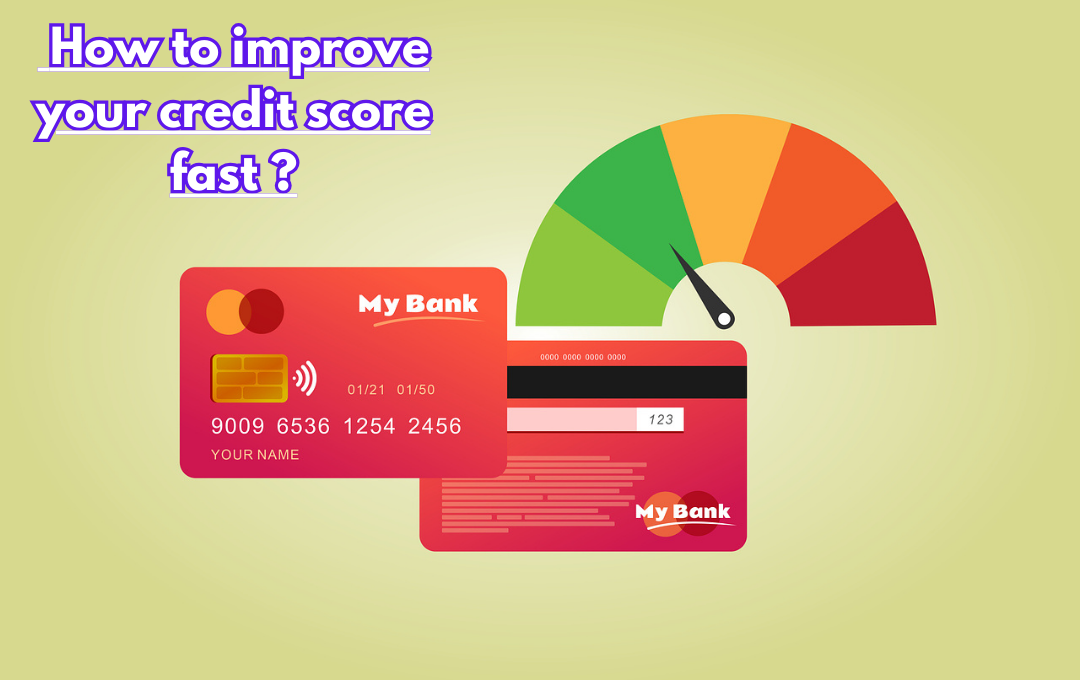How to Improve Your Credit Score Fast in the USA?
Your credit score is one of the most important factors in determining your financial health. Whether you’re looking to buy a home, get a car loan, or simply ensure you’re in a good position for the future, having a good credit score is crucial. Improving your credit score can take time, but there are strategies that can help you see improvements in a shorter period. If you’re aiming to boost your credit score quickly in the USA, here’s a comprehensive guide to get you on the right track.
1. Understand Your Current Credit Score
Before diving into improving your credit score, you need to know where you currently stand. In the USA, your credit score is usually represented as a number between 300 and 850, with higher numbers indicating better creditworthiness. The most commonly used credit scoring systems are FICO and VantageScore, with FICO being the most popular among lenders.
How to Check Your Credit Score:
- You can obtain a free credit report from each of the three major credit bureaus (Equifax, Experian, and TransUnion) once a year via AnnualCreditReport.com.
- Use free tools like Credit Karma or Credit Sesame, which can also give you an estimate of your credit score.
Once you know your credit score, it will be easier to identify the areas that need improvement.
2. Pay Your Bills on Time
One of the biggest contributors to your credit score is your payment history, making up around 35% of your FICO score. Late or missed payments can significantly hurt your credit score. However, improving this aspect can lead to a quick improvement.
Tips for Paying Bills on Time:
- Set up automatic payments: Automating payments ensures you never miss a due date, helping you maintain a positive payment history.
- Use calendar reminders: If you prefer manually paying your bills, set up reminders on your phone or calendar to stay on track.
- Prioritize late payments: If you’ve missed payments in the past, bring those accounts up to date as soon as possible to reduce the negative impact on your credit score.
3. Pay Down Credit Card Balances
Your credit utilization ratio, which compares your current credit card balances to your credit limits, is another key factor in your credit score. High credit utilization can hurt your score, while low utilization helps improve it.
Steps to Lower Credit Utilization:
- Pay off balances: Try to pay off any high credit card balances. The lower your balance, the better your credit utilization ratio will be.
- Spread balances across cards: If you have multiple credit cards, spread the balances to ensure no card is maxed out, thus keeping your utilization rate low.
- Request a credit limit increase: If you can’t pay off all your balances right away, consider asking your card issuer for a credit limit increase. A higher limit with the same balance will lower your utilization rate.
4. Dispute Errors on Your Credit Report
Credit reports are not always perfect. Sometimes, there could be errors that are negatively impacting your credit score, such as incorrect late payments or accounts that don’t belong to you.
How to Dispute Credit Report Errors:
- Review your credit report: Thoroughly go over each item on your credit report to spot any discrepancies or errors.
- File a dispute with the credit bureau: If you find an error, file a dispute with the credit bureau reporting the mistake. You can do this online, and the bureau is typically required to investigate within 30 days.
- Monitor your credit reports regularly: Continuously keep an eye on your credit reports to catch any new errors early on.
Correcting errors on your credit report can give your score an immediate boost.
5. Become an Authorized User on Someone Else’s Credit Card
If you have a friend or family member with good credit, you can ask them to add you as an authorized user on their credit card account. This allows you to inherit their positive payment history and improve your credit score, even if you don’t use the card yourself.
Steps to Becoming an Authorized User:
- Ask a trusted person: Ensure the person you’re asking has a good credit score and a history of on-time payments.
- Check with your card issuer: Some credit card issuers report authorized users’ credit activity to the credit bureaus, so confirm this beforehand.
- Monitor your credit report: Once added, check your credit report to ensure the card’s positive history appears on your report.
This tactic can improve your credit score relatively quickly if done correctly.
6. Pay Off Debt Strategically
Debt can weigh heavily on your credit score, but with a focused strategy, you can tackle it efficiently and improve your financial standing.
Debt Repayment Strategies:
- Debt Snowball Method: Start by paying off your smallest debts first while making minimum payments on larger ones. This builds momentum as you eliminate debts one by one.
- Debt Avalanche Method: Focus on paying off debts with the highest interest rates first. This approach saves you money on interest over time and can help you become debt-free faster.
- Consolidate Debt: Consider a personal loan or balance transfer credit card to consolidate high-interest debts into a single payment with a lower interest rate.
Paying off debt reduces your credit utilization ratio, which can significantly improve your credit score over time.
7. Avoid Closing Old Credit Accounts
The length of your credit history accounts for about 15% of your FICO score. Older credit accounts provide a longer track record for lenders to assess your creditworthiness. Closing these accounts can shorten your credit history and potentially hurt your score.
Why Keeping Accounts Open Helps:
- Preserves credit age: The longer you’ve had an account open, the better it reflects on your credit history.
- Maintains credit utilization: Keeping unused accounts open increases your overall credit limit, reducing your utilization ratio.
If you no longer use a credit card, consider keeping it open unless it has a high annual fee.
8. Limit New Credit Applications
Every time you apply for new credit, a hard inquiry is added to your credit report. Too many hard inquiries in a short period can lower your credit score and make you look risky to lenders.
Tips to Avoid Excessive Hard Inquiries:
- Be selective with applications: Only apply for credit when you truly need it.
- Prequalify for offers: Use prequalification tools to check eligibility for credit without affecting your score.
- Space out applications: Wait at least six months between applications for new credit.
Minimizing hard inquiries can help stabilize your credit score and prevent unnecessary drops.
9. Diversify Your Credit Mix
Having a mix of credit types, such as credit cards, installment loans, and mortgages, can improve your credit score. Your credit mix accounts for about 10% of your overall score.
How to Diversify Your Credit:
- Add an installment loan: If you only have credit cards, consider taking out a personal or car loan.
- Open a secured credit card: If you have no credit history, a secured credit card can help you establish a mix of credit accounts.
- Avoid unnecessary debt: Only diversify your credit mix if it aligns with your financial goals. Don’t take on debt just to improve your score.
A well-rounded credit portfolio shows lenders you can manage different types of credit responsibly.
10. Settle Collection Accounts
If you have debts in collections, they can severely damage your credit score. Settling these accounts, or at least paying them off, can help improve your credit.
Steps to Handle Collection Accounts:
- Negotiate with collectors: Many collection agencies are willing to accept a reduced payment to settle the debt. Ensure you get any agreement in writing before making a payment.
- Request a goodwill deletion: Once a collection account is paid, ask the creditor to remove it from your credit report as a gesture of goodwill.
- Monitor your credit report: Confirm that the settled account is reported accurately to the credit bureaus.
Paying off collections can stop further negative impacts and help rebuild your score over time.
11. Use Credit-Building Tools
There are several tools available that are designed specifically to help individuals improve their credit scores.
Effective Credit-Building Tools:
- Secured credit cards: These cards require a deposit as collateral and are an excellent option for building or rebuilding credit.
- Credit-builder loans: Offered by some credit unions and online lenders, these loans help establish positive payment history.
- Rent reporting services: Some services allow you to report your rent payments to credit bureaus, adding another layer to your payment history.
These tools are particularly helpful for individuals with limited or no credit history.
12. Practice Good Credit Habits
Sustaining a good credit score isn’t just about quick fixes; it’s about consistent, responsible behavior over time.
Good Credit Habits to Adopt:
- Review credit reports regularly: Check for errors or fraudulent activity and dispute any inaccuracies.
- Pay more than the minimum due: This reduces your balances faster and saves on interest.
- Avoid maxing out credit cards: Try to keep your credit card utilization below 30%, and ideally below 10%.
By building strong habits, you can maintain a healthy credit score in the long term.
13. Monitor Your Progress
Tracking your credit score improvement helps you stay motivated and adjust your strategies if needed.
Ways to Monitor Progress:
- Use free credit score tools: Apps like Credit Karma or Experian provide frequent updates on your credit score.
- Check your credit report quarterly: Regularly reviewing your credit report ensures you’re aware of any changes or new accounts.
- Celebrate milestones: As your credit score improves, take time to acknowledge your progress.
Consistent monitoring keeps you on track toward your financial goals.
15 Tips to Improve Your Credit Score Fast in the USA
Here’s a concise list of actionable tips to help you quickly boost your credit score and maintain financial health:
1. Pay Bills on Time
Your payment history is the biggest factor in your credit score. Set reminders or automate payments to ensure you never miss a due date.
2. Lower Credit Card Balances
Aim to keep your credit utilization ratio below 30%, and ideally under 10%. Pay off as much of your balance as possible to improve your score.
3. Check for Errors on Your Credit Report
Review your credit reports from the three major bureaus (Equifax, Experian, TransUnion) for mistakes. Dispute inaccuracies to have them corrected.
4. Become an Authorized User
Ask someone with a strong credit history to add you as an authorized user on their credit card. This can improve your credit by adding their positive history to your report.
5. Avoid Closing Old Accounts
Older accounts contribute to your credit history’s length. Keep them open unless they come with high fees.
6. Limit New Credit Applications
Each hard inquiry can temporarily lower your credit score. Only apply for credit when necessary.
7. Diversify Your Credit Mix
Having a combination of credit types, such as credit cards, loans, and mortgages, can positively impact your score.
8. Negotiate and Pay Off Collections
If you have accounts in collections, negotiate a settlement or pay them off. Request that the creditor remove the negative mark as part of the agreement.
9. Use a Secured Credit Card
If you’re building or rebuilding credit, a secured credit card backed by a deposit is a safe way to establish positive payment history.
10. Request a Credit Limit Increase
If eligible, increasing your credit limit can improve your credit utilization ratio without needing to reduce your balance.
11. Pay More Than the Minimum Due
Paying more than the minimum on your credit cards reduces balances faster and saves money on interest, boosting your score over time.
12. Avoid Maxing Out Credit Cards
Try to keep your balance well below your credit limit on all cards. A lower utilization ratio leads to better credit scores.
13. Leverage Credit-Builder Loans
Take out a credit-builder loan from a credit union or online lender to establish a record of on-time payments.
14. Report Rent Payments
Some services allow you to report rent payments to credit bureaus, adding a positive factor to your credit history.
15. Monitor Your Credit Progress
Use tools like Credit Karma or Experian to track your credit score and identify areas for improvement regularly.
By implementing these 15 tips, you can see measurable improvements in your credit score and lay a strong foundation for long-term financial success.
Conclusion
Improving your credit score fast in the USA is possible with the right strategies and a commitment to responsible financial habits. From paying down debt to disputing errors on your credit report, each step contributes to building a better financial foundation. Remember, improving your credit is a marathon, not a sprint. Stay patient, consistent, and proactive.
FAQs
1. How quickly can I improve my credit score?
It depends on your starting point and actions. Some improvements, like lowering credit utilization or disputing errors, can show results in a few weeks, while others may take months.
2. Will paying off a credit card increase my score?
Yes, paying off a credit card can lower your credit utilization, which is a significant factor in your credit score.
3. Does checking my credit score hurt it?
No, checking your own credit score is considered a soft inquiry and does not affect your score.
4. Can I repair my credit myself, or do I need professional help?
You can repair your credit on your own by following the steps outlined above. However, professional help may be beneficial for complex issues.
5. How long do negative marks stay on my credit report?
Most negative marks, such as late payments or collections, stay on your credit report for seven years, though their impact lessens over time.







Thanks for sharing. I read many of your blog posts, cool, your blog is very good. https://www.binance.com/en/register?ref=JHQQKNKN
Thanks for sharing. I read many of your blog posts, cool, your blog is very good. https://www.binance.com/en/register?ref=JHQQKNKN
Alright, winpkrlogin seems interesting. Logging in and ready to roll! Can’t wait to see what kind of games they offer. Start playing winpkrlogin
Thank you for your sharing. I am worried that I lack creative ideas. It is your article that makes me full of hope. Thank you. But, I have a question, can you help me? https://accounts.binance.com/bn/register?ref=WTOZ531Y